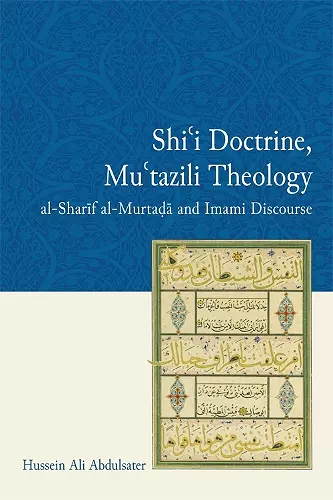Shi'i Doctrine, Mu'tazili Theology
al-Sharif al-Murtada and Imami Discourse
Format:Hardback
Publisher:Edinburgh University Press
Published:23rd May '17
Currently unavailable, and unfortunately no date known when it will be back

Comprehensive coverage of an enormous oeuvre (running several thousand pages) and diversity (spanning virtually all contemporary fields of knowledge). A meticulous engagement with long and dense theoretical texts that are either in manuscript form or poorly edited. An orderly presentation that equips readers with an overall understanding of Shi'i theology in its main phases while preserving the profundity of analysis. A study of little-known author whose views, nonetheless, are still a major influence for Shi'i Muslims.
A study of a little-known author – al-Sharīf al-Murtaḍā – whose views are still a major influence for Shiʿi Muslims.God is not free to act; He is bound by human ethics. To be just, He must create an individual of perfect intellect and infallible morality. People are obligated to submit to this person; otherwise eternal damnation awaits them. While these claims may be interpreted as an affront to God’s power, an insult to human judgment and a justification for despotism, Shiʿi Muslims in the eleventh century eagerly adopted them in their attempts to forge a ‘rational’ religious discourse. They utilized everything from literary studies and political theory to natural philosophy and metaphysical speculation in support of this project. This book presents the contribution of al-Sharīf al-Murtaḍā (d. 1044) of Baghdad, the thinker most responsible for this irreversible change, which remains central to Imami identity. It analyzes his intellectual project and establishes the dynamic context which prompted him to pour the old wine of Shiʿi doctrine into the new wineskin of systematic Muʿtazili theology.
The author successfully provides a well-organized map of al-Murtaḍā’s theological thought, deploying his vast magna opera, fulfilling a demanding task. In every chapter, Abdulsater follows an elaborate plan to present the content of his analysis. He starts with the theoretical model, and then moves to the concepts at work, then arguments, and at last conclusions. His approach renders the book a smooth read. -- Majid Montazer Mahdi * Reading Religion *
Among the chief accomplishments of this study is its meticulous discussion of the issue of “influence.” (...) This and other results of this commendable work make it an invaluable source for the study of early Shiite theology and history. -- Hamed Fayazi * Religious Studies Review *
ISBN: 9781474404402
Dimensions: unknown
Weight: 526g
256 pages